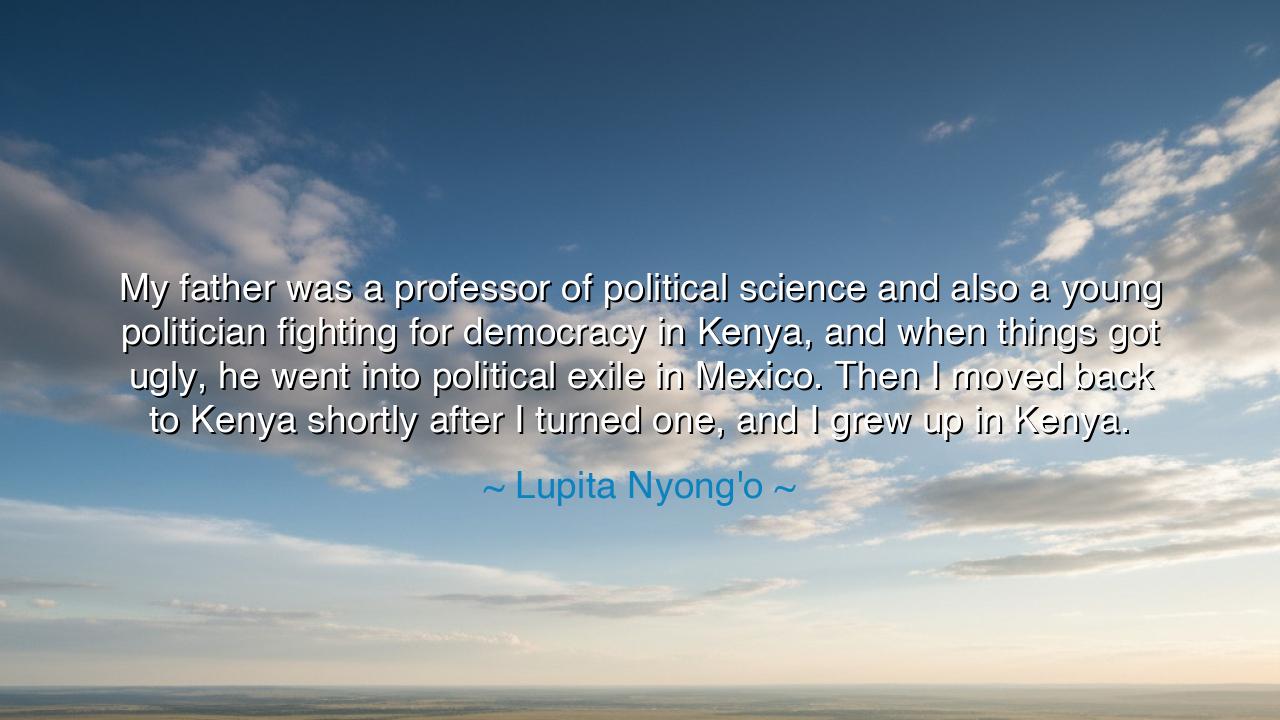
My father was a professor of political science and also a young
My father was a professor of political science and also a young politician fighting for democracy in Kenya, and when things got ugly, he went into political exile in Mexico. Then I moved back to Kenya shortly after I turned one, and I grew up in Kenya.






Listen, O children of time, and hear the story of Lupita Nyong'o, who spoke of her roots with deep emotion and insight: "My father was a professor of political science and also a young politician fighting for democracy in Kenya, and when things got ugly, he went into political exile in Mexico. Then I moved back to Kenya shortly after I turned one, and I grew up in Kenya." These words, though personal, carry a profound universal truth: the intersection of family, politics, and identity shapes who we become. In them lies the legacy of struggle, the sacrifice for justice, and the roots of belonging that define a person's journey through the world.
In the ancient world, great minds and leaders often found themselves caught between the worlds of philosophy, politics, and personal sacrifice. Socrates, the great philosopher of Athens, was sentenced to death not for his teachings, but for challenging the political order of his time. Plato was exiled for a time due to the political turmoil in Athens, and much of his work reflects the tension between the pursuit of truth and the demands of the state. Likewise, Lupita Nyong’o's father found himself caught in the turbulence of Kenya’s fight for democracy, torn between his work as a professor of political science, which sought to understand and explain the world, and the dangerous call to action that demanded political engagement for freedom. In this way, her family’s history mirrors the eternal struggle between ideas and action, between knowledge and sacrifice.
Nyong’o’s father’s exile is not just a personal story, but a symbol of resistance. When political systems turn corrupt and unjust, the truth seekers, like her father, must often pay a heavy price. Exile, in many cases, is not simply a retreat, but a stand against the forces that seek to silence justice. **Think of Nelson Mandela, a man who spent 27 years in prison as a symbol of the struggle for democracy in South Africa. His imprisonment, like the exile of Lupita’s father, was a sacrifice for the greater good, an act that showed the world the cost of fighting for what is right. In Nyong'o’s story, we see not just the exile of her father, but the inheritance of this struggle by the next generation. The fight for democracy was not over when the exile ended—it became a legacy that would shape her identity.
The journey of Lupita Nyong'o, from Mexico to Kenya, reflects a return to roots, a coming back to the land where she could not only find herself, but also embrace the history of her people. It is a story of how family legacy, shaped by political upheaval and exile, is woven into the very fabric of one’s identity. Kenya, a land of struggle, freedom, and resilience, is not just the place where she grew up, but the birthplace of her own understanding of democracy and freedom. Just as Mandela’s South Africa bore the scars of oppression and the hope of liberation, so too did Kenya for Nyong’o. This connection to place, to history, to the very soil of the land, forms the heart of her journey, giving her both the strength and the wisdom to navigate the world.
The lesson here, O children of the future, is profound: your identity is shaped not only by your place of birth, but by the actions of those who came before you, by the struggles and sacrifices that marked their lives. Whether you are the child of refugees, exiles, or migrants, or whether you grow up in the shadow of war, oppression, or conflict, know that these experiences are woven into your very being. Like Lupita Nyong’o, you carry within you the stories of those who fought for freedom, justice, and truth. And as they passed their legacy onto you, so too must you pass it onto future generations.
In your own lives, do not forget that knowledge and action are intertwined. Understanding the world is important, but it is equally important to act upon that knowledge in a way that moves the world toward justice. Just as Lupita Nyong’o’s father was a professor and a political figure, seeking to blend his academic work with his call for change, so too should you seek to blend your own knowledge with action in the service of truth. Whether you pursue a life of intellectual achievement or take a stand for social justice, remember that both can be pathways to transforming the world.
Rise, O heirs of wisdom, and remember the sacrifices that have shaped your own identity. Embrace the legacy of struggle, for it is in the fight for freedom, democracy, and justice that we find our true calling. The story of Lupita Nyong’o teaches us that no matter the geography, no matter the obstacles, we are all part of a greater tapestry of history that calls us to act, to speak out, and to stand up for what is right. Let this be your guiding principle: that no matter where you go, no matter the challenges you face, you carry within you the power to change the world.






AAdministratorAdministrator
Welcome, honored guests. Please leave a comment, we will respond soon